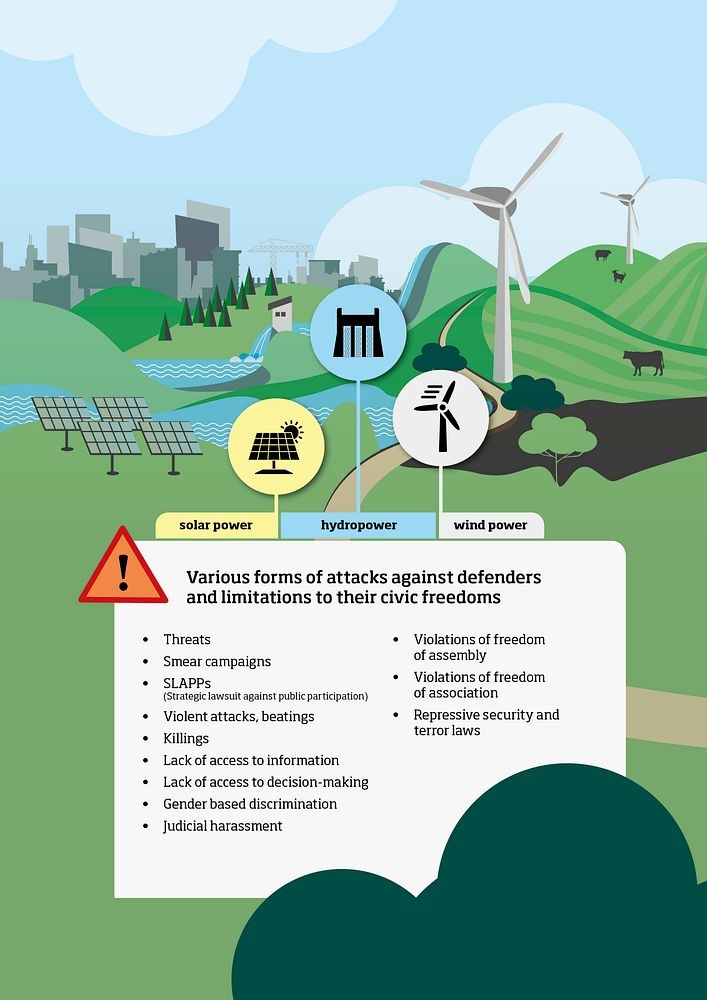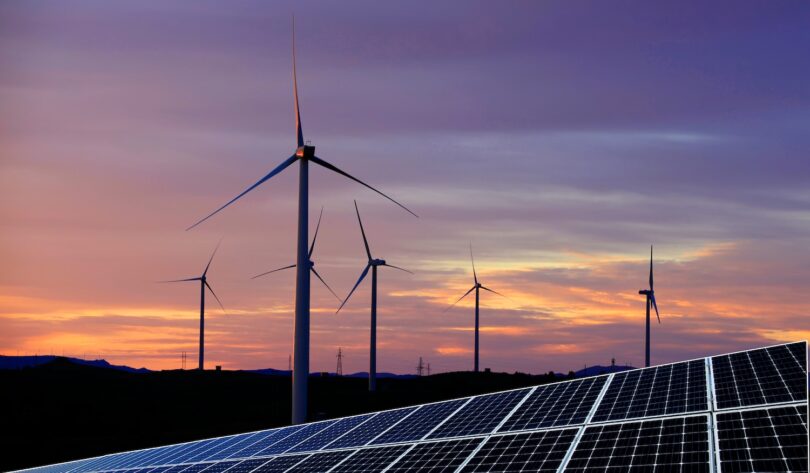A new report by the research organization Swedwatch highlights critical human rights risks associated with the global transition to renewable energy. The report reveals that human rights and environmental defenders face serious threats and reprisals in countries where renewable energy projects are being rapidly developed.
More than half of the world’s total prospective wind farm capacity, and more than two thirds of the prospective solar farm capacity, is estimated to take place in countries with obstructed, repressed or closed civic space.
While scaling up wind, solar, and hydropower is essential to limiting global warming to 1.5°C, this growth must not come at the expense of human rights.
-We cannot build a green future on the backs of those who are silenced or displaced. The renewable energy transition must not come at the cost of human rights. Defenders are not obstacles – they are essential allies in ensuring that this is just, equitable, and sustainable, says Alice Blondel, Director Swedwatch.
Renewable energy projects require large land areas, often affecting local communities, ecosystems, and livelihoods. Swedwatch’s analysis shows that the renewable energy transition will largely take place in countries with restricted civic space and poor human rights protections, where defenders who raise concerns often face harassment, legal persecution and at times even deadly violence.
The report Renewables and Reprisals – Defenders at risk in the green energy transition in Brazil, Honduras, Mozambique, and the Philippines is based on a global mapping of such high-risk areas for defenders, where civic space is restricted and where renewable energy expansion is projected to accelerate. Additionally, the report presents four case studies from Mozambique, Honduras, Brazil, and the Philippines, where defenders and affected community members describe restrictions and reprisals of defenders linked to renewable energy projects.
The report is authored by Swedwatch with input from Terramar Institute (Instituto Terramar), Network of Women Human Rights Lawyers and Defenders (Red de Abogadas Defensoras de Derechos Humanos) and Jalaur River for the People’s Movement (JRPM).
-The report underscores the urgent need for stronger protections for defenders, transparent consultation processes, and corporate accountability. Without immediate action, the rapid expansion of renewables risk repeating the same human rights abuses seen in industries such as mining and agribusiness, rather than fostering a truly just energy transition, says Alice Blondel.
Expansion of renewables in countries with high risks for defenders
Swedwatch’s findings indicate that a large share of the expansion of renewable energy is taking place in countries where civic space is restricted, and defenders are at significant risk.
Half of the world’s total prospective wind farm capacity and more than two-thirds of the total solar farm capacity are expected to be developed in countries where civic freedoms are obstructed, repressed, or entirely closed (measured by the sum of their respective percent of global total).
In 16 of the top 20 countries in prospective solar farm capacity and ten of the top 20 in wind farm capacity civic space is severely restricted.
-If we look at indices of deadly violence against defenders, as measured by Global Witness, and compare it to the countries with the highest prospective solar and wind farm capacity, several of the top countries are also among the most dangerous for defenders, for instance Colombia, Brazil, the Philippines and Mexico. This should raise a red flag that prompts extra attention to defenders-related risks in companies and investors’ human rights due diligence. Business actors should adopt zero-tolerance policies against reprisals against defenders in renewable energy projects, says Jessica Johansson, Program Officer at Swedwatch and head author of the report.

Case studies: Defenders under threat
In the four case studies, defenders from Mozambique, Honduras, Brazil and the Philippines described restrictions of basic civic freedoms and risks of verbal, legal or violent physical attacks when reporting about impacts of renewable energy projects.
Mozambique: According to interviews in the report, the planning of the Mphanda Nkuwa hydropower project has been marred by inadequate social and environmental impact assessments, lack of transparency, and suppression of civic engagement. Defenders reported threats, violation of freedom of assembly, and an overall disregard for their right to participate in decision-making processes.
Honduras: Human rights defenders have faced legal intimidation through SLAPPs (Strategic Lawsuits Against Public Participation) for their criticism of the Los Prados solar power project, according to a group of women human rights lawyers. Community members involved in protests have allegedly been surveilled and subjected to repressive actions by security forces. Defenders also reported smear campaigns in the media, further restricting their ability to voice concerns.
Brazil: In Brazil, the wind power project Bons Ventos failed to properly include impacted communities, including marginalized groups, traditional fishing, and quilombola communities, in consultations, according to interviews. Defenders decided to remain anonymous in the interviews out of fear of reprisals, citing increasing threats and violence against defenders in the past years.
The Philippines: Indigenous defenders from the Tumandok communities were allegedly threatened, harassed, and killed when the national police and the armed forces raided their communities after community leaders criticized the Jalaur River Multipurpose project, according to a CSO operating in the area. Defenders reporting on the dam project outlined persecution, surveillance and red-tagging – terror-labelling by the government accusing defenders of being communist insurgents, creating an environment of fear and impunity.
Swedwatch´s recommendations
As the world races to meet climate targets, a just transition must include the voices of those most affected by energy projects, and defenders are essential in ensuring that renewable energy projects respect human rights and the environment.
-Governments, businesses, and financial institutions must work together to ensure that human rights are protected, and that defenders can operate without fear of repression or violence. Engaging with defenders as valuable partners rather than as adversaries can help governments and businesses ensure renewable energy projects’ alignment with international human rights obligations, mitigate conflicts, and promote sustainable development, says Jessica Johansson.
Detailed recommendations to different actors can be found in the report, below the main ones are summarized:
Recommendations for governments:
- Adopt legislation on mandatory human rights due diligence (HRDD) for companies, highlighting risks to defenders and meaningful consultation with defenders.
- Adopt laws on company transparency laws and access to information.
- Establish and enforce protections for defenders, ensuring they can operate without fear of retaliation, and provide effective legal remedies for those affected by violations.
Recommendations for companies and investors:
- Strengthening their HRDD processes by integrating civic space risks and ensuring meaningful stakeholder engagement with defenders.
- Adopt and enforce a zero-tolerance policy against reprisals targeting defenders (and affected communities).
- Take appropriate action when business partners or third parties commit violations in relation to their business activities.
FACT BOX
Key findings in Swedwatch´s report: Renewables and Reprisals – Defenders at risk in the green energy transition in Brazil, Honduras, Mozambique, and the Philippines
- Over half of the world’s future wind farm capacity and two-thirds of solar farm capacity are projected to be developed in countries with restricted civic space.
- Several top renewable energy transition countries also have the highest rates of killings of defenders, including Brazil and the Philippines for prospective wind farm capacity, and Brazil, the Philippines, Colombia and Mexico for prospective solar farm capacity.
- Case studies from Mozambique, Honduras, Brazil, and the Philippines point to failures in stakeholder consultation, transparency, and respect for defenders’ rights. As the transition picks up speed and pace, more systematic documentation of the risks against defenders is needed.
- Companies and investors often fail to fully integrate human rights due diligence (HRDD) and civic space risks into their business practices, and integrate defenders as valuable stakeholders.
- Governments must take decisive action to protect defenders and uphold international human rights standards in the renewable energy sector.
FACT BOX
Methodology: A data-driven and collaborative approach
To identify under-documented risks to defenders in the renewable energy sector, Swedwatch conducted a global mapping of high-risk areas for defenders, focusing on wind and solar energy expansion. The analysis combined civic space data from CIVICUS with renewable energy projections from the Global Energy Monitor and TransitionZero.
To illustrate impacts and risks that defenders might face in the renewable energy sector, a few selected interviews with defenders and affected community members in Mozambique, Honduras, Brazil, and the Philippines were conducted.
Cases and interviewees were identified together with four of Swedwatch´s memberorganisations, including the Swedish Society for Nature Conservation, Diakonia, Afrikagrupperna, and Act Church of Sweden, who also provided input to the report. In addition Swedwatch´s member organization Solidarity Sweden-Latin America also stands behind the report.
The cases were selected to demonstrate representative high-risk cases for defenders in the renewable energy sector. The representative cases were chosen to cover 1) different energy forms (solar, wind and hydropower), 2) different geographical regions, and 3) different types of restrictions to defenders’ work.
The selection is not an exhaustive mapping, but an illustration of how defenders can be impacted in renewable energy projects when civic space is restricted to begin with, and defenders-related safeguards are overlooked.
FACT BOX
Companies replies
Swedwatch reached out to the companies and investors mentioned in the report, offering them an opportunity to comment on the findings. Eight of eleven companies and investors provided responses, which are summarized in the report, with full statements available on Swedwatch’s website: https://swedwatch.org/themes/report-human-rights-defenders-at-risk-in-the-renewable-energy-transition/
EDF (Électricité de France), TotalEnergies, Sumitomo in the Mphanda Nkuwa dam project in Mozambique, Scatec, KLP and Norfund in the Los Prados solar power case in Honduras, and the Nordic Investment Bank and the Brazilian Development Bank BNDES in the Bons Ventos wind farm case in Brazil submitted answers, assuring compliance with social standards, and commitment to dialogue with stakeholders. CPFL and BNB in Brazil, and Daewoo Engineering & Construction Co. Ltd in the Philippines, never provided answers on the alleged violations.







